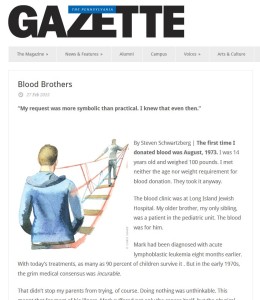
Steven Schwartzberg’s essay “Blood Brothers” appeared in the Feb 17 2015 issue of The Pennsylvania Gazette.
An article recently came across my desk. I pass it along especially for a dearly beloved who awhile back shared a different article from a grieving mother who took a famous televangelist to task for his theory of grieving. (That theory was, in a nutshell: “Get over it. Pronto. That’s what real Christians do.”) This article has a different message.
Here’s what I experience when it comes to grief: We all grieve in different ways. Just as every oak tree is similar, I can recognize in others the grief that is in me. And just as every oak tree is absolutely never-to-be-repeated different, I can recognize that the ways we grieve aren’t the same. And that’s ok. Seems it’s part of the program.
Elizabeth Kubler-Ross’ “stages of grief” (anger, denial, depression, bargaining, acceptance) are more like “experiences of grief” than stages. (NB: these were observed watching people dealing with news of their own looming death following a life-threatening diagnosis. But I digress.) In the consumerist, bottom-line water in which we swim, there’s a sense that “acceptance” is the ultimate goal after which we know we are done. But Kubler-Ross herself insisted that her stages are not sequential. Nor do they fall into nice, neat, linear progression. They are experiences that come and go. They are experiences that inter-penetrate. Some lie quiet for a season… even a very long season as this article indicates… only to resurface without warning or fanfare. Some coexist in complete, happy contradiction. Some, barely noticed; maybe even absent. So, man of a certain age that I am; I can accept my boyhood friend’s death as a young adult yet still get angry, or still find myself in denial (“Is that him I just saw walking down our street?”).
I have a working hypothesis that the extent to which one grieves is directly proportional to the extent to which one loves. (Which could move me onto a jag about the extent to which some people who–especially those who insistently, constantly refer to themselves as “religious”– use love of their religion or their God to mask a reduced capacity to love real flesh-and-blood people. But I won’t.) Grief is the price we pay for having loved. And that price is worth it. And more. So much more.
The loss of somebody who entered my heart isn’t something to “get over.” Get through; maybe. Get along with; more like it.
Grief does change. And it certainly changes me. Even, sometimes, for the better. When I let it. The grief I hold for my Grandmother today is different than it was when I first heard my cousins unknowingly announcing the news with their sobs in the other room. My having been visited by that death all these years ago doesn’t mean I don’t tear up when I hear a particular hymn, or that my heart doesn’t swell to break a little bit more when I smell the pink of those candies she always gifted us with when we left their house.
But more objectionable than what I consider the faulty theology of the televangelist’s advice, it’s the prior assumption that there’s some Platonic ideal “Grief” to which all must adhere if they’re to be truly good, religious, and adult. Of course, good, religious, and adult are all in the eyes of the beholder (and, as Jesus might say, not all they’re cracked up to be). Full of a hermeneutic of generosity, I believe our brother minister was simply speaking from his own understanding of his personal grief and his idiosyncratic reading of what he deems as scripture. He simply did what so many of us perfectly imperfect humans do: mistake his personal experience for The Normative Experience. I don’t fault his testimony of grief. I do fault him for presenting his personal “is” as a universal “ought.”
It’s no surprise that we all move through life holding our grief in different ways. And in different ways at different times. Seems to be part of the program. Dear sister, dear brother, I just want you to know that I’m here for you in your grief, wherever it may take you, whatever stage/s you’re in, whenever you’re in it/them, however long you’re there. I’m here for you. My heart goes out to you. My heart breaks with you. And–here’s my own theology showing– so does God’s. You are loved.
– Rev Dave

